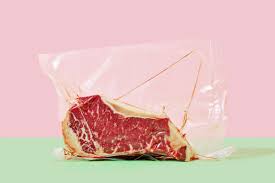Discussions about the human diet often spark debate — especially when it comes to whether meat should be included. Depending on who you ask, answers may be rooted in science, ethics, personal experience, or cultural tradition.
This article explores the biological, nutritional, and cultural factors that shape the question: Are humans meant to eat meat?
Are Humans Physically Designed to Eat Meat?
To meet their needs for survival, all species — including humans — constantly evolve in response to their environment, available resources, and conditions.
Genetic evidence going back as far as 300,000 years suggests humans have always adapted to their surroundings and diets (1).
That means the idea that humans were “originally built” to eat only one kind of food and should stick to it doesn’t align with evolutionary science.
While early animal ancestors were largely carnivorous, many species have since evolved into herbivores. Likewise, humans have developed omnivorous traits — meaning we are capable of consuming both plant- and animal-based foods (2, 3).
Our teeth illustrate this well:
-
Incisors, premolars, and molars help grind plant matter (like herbivores).
-
Canine teeth, sharper and pointed, help tear through meat (like carnivores).
What Does Human Biology Suggest?
Humans are biologically capable of eating fruits, vegetables, grains, seeds, and roots — but not all plant materials are fully digestible.
The outer wall of plant cells contains fiber compounds like cellulose and lignin, which our bodies can’t break down due to the lack of an enzyme called cellulase (4).
While herbivores such as cows and goats also don’t produce cellulase themselves, they host gut microbes that do — humans generally don’t have these bacteria in sufficient quantities (5, 6).
In contrast, humans do produce the enzymes necessary for digesting animal foods, such as protease (for protein) and lipase (for fats) (7).
From an evolutionary standpoint, an animal’s digestive tract reflects its diet.
-
Carnivores have shorter guts because their calorie-dense diet requires less time to break down.
-
Herbivores, who eat less calorie-dense food, need longer digestive tracts to extract enough nutrients.
Humans, as omnivores, have a digestive tract that falls somewhere in the middle — long enough for plant digestion but also efficient at processing meat (8, 9, 10).
Is Meat Essential for Nutrition?
Some nutrients found in animal products are hard to get from plants alone.
A prime example is vitamin B12, which is crucial for nerve function and red blood cell production. Plant-based diets don’t supply this nutrient naturally, so vegans must supplement with B12 to avoid deficiency (11, 12).
Other nutrients that are scarce or absent in vegan diets include:
-
Creatine
-
Vitamin D3
-
Omega-3 fatty acids like DHA
Though your body can make small amounts of these compounds on its own, the conversion is inefficient. Studies show that vegetarians and vegans often have lower blood levels of DHA and EPA, so plant-based omega-3 supplements (usually from algae) are recommended (13–17).
Dairy, eggs, and fish can help fill these nutritional gaps in lacto-, ovo-, or pescatarian diets.
That said, vegetarians and vegans also need to be mindful of other potential nutrient shortfalls, such as iron, zinc, iodine, protein, and calcium (18–24).
Proper planning and supplementation can help plant-based eaters meet their nutritional needs.
Health Outcomes: Omnivores vs. Plant-Based Diets
It’s worth considering both the benefits and risks of eating meat — especially processed meat.
Some research links processed meats to a slight increase in the risk of colorectal cancer. High meat consumption has also been associated with higher all-cause mortality, though many factors can influence these results (25–28).
Conversely, plant-based diets have been consistently linked to:
-
Lower risk of heart disease
-
Possibly reduced cancer risk (though evidence is still emerging)
With proper supplementation and balanced meal planning, vegetarian and vegan diets can provide all necessary nutrients (29–33).
Cultural and Personal Ties to Meat
Food isn’t just about nutrition — it’s also about identity, heritage, and community.
In many cultures, meat plays a central role in traditional meals, family gatherings, and religious rituals. What people eat often reflects their environment, history, and available resources.
For some, meat is a deeply rooted part of cultural identity. For others, avoiding it may feel equally important for personal or ethical reasons.
Neither perspective is right or wrong — both are valid reflections of human diversity (34).
Final Takeaway
Biologically and nutritionally, humans can eat and digest meat — but we don’t have to.
Our omnivorous anatomy allows us to consume a wide variety of foods. Yet personal beliefs, cultural customs, and health goals also shape dietary choices.
Whether or not you eat meat is entirely up to you. It may stem from tradition, nutrition, ethics, or a combination of factors.
In the end, there’s no one-size-fits-all answer — just the decision that aligns best with your body, values, and lifestyle.

